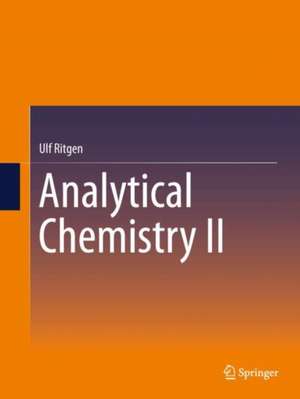Analytical Chemistry II
Autor Ulf Ritgen Contribuţii de Christina Oligschlegeren Limba Engleză Paperback – 9 oct 2024
This workbook takes you through the successful textbook Skoog/Holler/Crouch, Instrumentelle Analytik and is designed primarily for self-study.In five parts, the lecture content of more advanced analytical chemistry is summarized and explained using selected examples: mass spectrometry and nuclear magnetic resonance spectroscopy deal with the investigation of molecules, and numerous electroanalytical methods such as potentiometry, coulometry, amperometry and voltammetry are also covered. An overview of more specialized analytical methods includes the use of radioactive substances and various fluorescence methods, as well as methods of information acquisition in the increasingly important electrochemical and optical sensor technology and their automation. The course concludes with a summary of various principles and application methods of statistics, which are simply indispensable in the context of analytics. In order to facilitate independent learning, references to essential sections and illustrations of the textbook are made throughout the book.
Not least because of the numerous examples, the book, which is aimed at students of chemistry or related scientific subjects, provides an easy-to-understand introduction to more complex aspects of analytical chemistry. In direct continuation of the workbook Analytical Chemistry I, references are made again and again to already known basics from other courses, which facilitate the linking of the familiar and the new. Learning with this workbook has been tested in a distance learning chemistry course and facilitates preparation for module examinations in more advanced analytical chemistry.
This book is a translation of the original German 1st edition Analytische Chemie II by Ulf Ritgen, published by Springer-Verlag GmbH Germany, part of Springer Nature in 2020. The translation was done with the help of artificial intelligence (machine translation by the service DeepL.com). A subsequent human revision was done primarily in terms of content, so that the book will read stylistically differently from a conventional translation. Springer Nature works continuously to further the development of tools for the production of books and on the related technologies to support the authors.Preț: 366.53 lei
Preț vechi: 441.61 lei
-17% Nou
Puncte Express: 550
Preț estimativ în valută:
70.14€ • 76.17$ • 58.92£
70.14€ • 76.17$ • 58.92£
Carte nepublicată încă
Doresc să fiu notificat când acest titlu va fi disponibil:
Se trimite...
Preluare comenzi: 021 569.72.76
Specificații
ISBN-13: 9783662687093
ISBN-10: 3662687097
Pagini: 367
Ilustrații: XI, 367 p. 101 illus., 2 illus. in color.
Dimensiuni: 210 x 279 mm
Ediția:1st ed. 2024
Editura: Springer Berlin, Heidelberg
Colecția Springer
Locul publicării:Berlin, Heidelberg, Germany
ISBN-10: 3662687097
Pagini: 367
Ilustrații: XI, 367 p. 101 illus., 2 illus. in color.
Dimensiuni: 210 x 279 mm
Ediția:1st ed. 2024
Editura: Springer Berlin, Heidelberg
Colecția Springer
Locul publicării:Berlin, Heidelberg, Germany
Cuprins
I Molecular spectroscopy.- General.- Mass spectrometry (MS).- Nuclear magnetic resonance spectroscopy (NMR).- II Electroanalytical methods.- General.- Potentiometry.- Coulometry.- Amperometry.- Voltammetry.- III Other analytical methods.- Gravimetric analysis.- Thermal methods.- Use of radioactive nuclides.- Fluorescence methods.- IV Sensors and automation techniques.- General information on sensors.- Electrochemical sensors.- Optical sensors (optodes).- Flow injection analysis (FIA).- V Statistics.- Experimental errors.- Statistical errors.- Gaussian error propagation.- Measured value distribution.- Parameter estimates.- Method validation.- Outlier tests.- Glossary.
Notă biografică
Ulf Ritgen teaches general chemistry, analytical chemistry, inorganic chemistry and biochemistry at the Bonn-Rhein-Sieg University of Applied Sciences and the ZVA-Bildungszentrum Dormagen. He is the author of several textbooks and exercise books, including the associated first volume Analytical Chemistry I.
Textul de pe ultima copertă
This workbook leads through the successful textbook Skoog/Holler/Crouch, Instrumentelle Analytik and is designed primarily for self-study. In five parts, the lecture content of more advanced analytical chemistry is summarized and explained using selected examples: Mass spectrometry and nuclear magnetic resonance spectroscopy deal with the investigation of molecules, and numerous electroanalytical methods such as potentiometry, coulometry, amperometry and voltammetry are also covered. An overview of more specialized analytical methods includes the use of radioactive substances and various fluorescence methods, as well as methods of information acquisition in the increasingly important electrochemical and optical sensor technology and their automation. The course concludes with a summary of various principles and application methods of statistics, which are simply indispensable in the context of analytics. In order to facilitate independent learning, references to essential sectionsand illustrations of the textbook are made throughout the book.
This book is a translation of the original German 1st edition Analytische Chemie II by Ulf Ritgen, published by Springer-Verlag GmbH Germany, part of Springer Nature in 2020. The translation was done with the help of artificial intelligence (machine translation by the service DeepL.com). A subsequent human revision was done primarily in terms of content, so that the book will read stylistically differently from a conventional translation. Springer Nature works continuously to further the development of tools for the production of books and on the related technologies to support the authors.
Not least because of the numerous examples, the book, which is aimed at students of chemistry or related scientific subjects, provides an easy-to-understand introduction to more complex aspects of analytical chemistry. In direct continuation of the workbook Analytical Chemistry I, references are made again and again to already known basics from other courses, which facilitate the linking of the familiar and the new. Learning with this workbook has been tested in a distance learning chemistry course and facilitates preparation for module examinations in more advanced analytical chemistry.
Ulf Ritgen teaches general chemistry, analytical chemistry, inorganic chemistry, and biochemistry at the Bonn-Rhein-Sieg University of Applied Sciences and the ZVA-Bildungszentrum Dormagen. He is the author of several textbooks and exercise books, including the associated first volume Analytical Chemistry I.
This book is a translation of an original German edition. The translation was done with the help of artificial intelligence (machine translation by the service DeepL.com). A subsequent human revision was done primarily in terms of content, so that the book will read stylistically differently from a conventionaltranslation.
Caracteristici
Designed for self-study chemistry Tested in a distance learning chemistry course Analytical chemistry for advanced students - comprehensible and structured
